1 Card Blind Analysis
An analysis of some decks for the 1 card blind format.
I saw this Cardmarket - Magic video and thought it was very interesting so I wanted to see what other options there would be in this format that the wonderful people at the Cardmarket channel have created. For most things I will go off of the video, so this will also be an analysis of the video I suppose.
Rules
From what I can make out from the video, the rules are as follows. Players create a one-card deck, they don’t lose to drawing from an empty library. But, most importantly, all spells can be cast without paying for them. It is unclear if this includes extra costs, so I will say that they are not, all X’s are 0 for the same reason. It would be as if each player has an Omniscience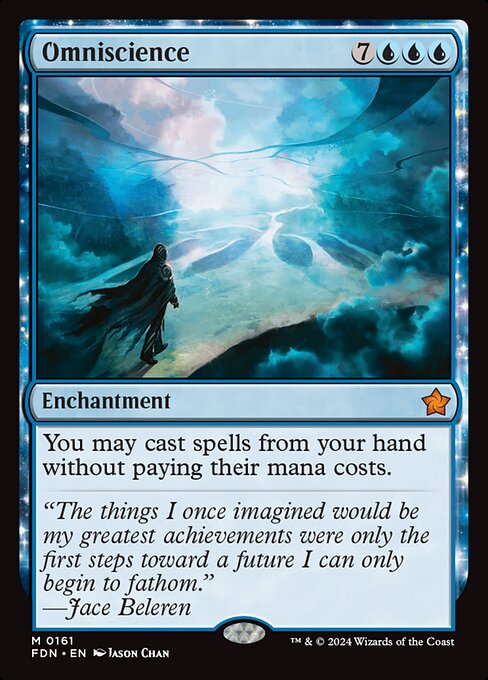 .
.
I also want to take some inspiration from 3 Card Blind by looking at this from a pure analysis standpoint. Both players will have perfect information, meaning they know what is in their opponents hand, or any other hidden zones. Because they have one card this is not difficult. Every random decision will be made by the opponent of the one who played the card. If I cast an Ancient Gold Dragon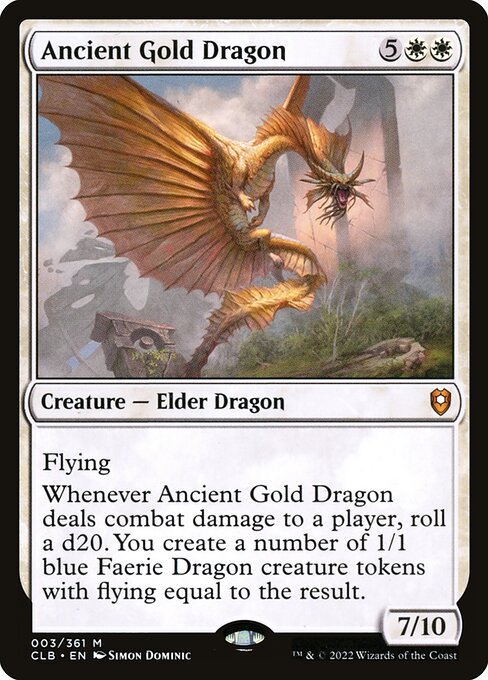 and hit you then you are allowed to choose what the result is.
and hit you then you are allowed to choose what the result is.
We will look at both cards to see what happens if one goes first or second. The rest of the rules are the same as the 3 Card Blind Rules. Let’s get into it!
Big Creatures
One way to win in this format is by, well, attacking with a big creature. One of those big creatures is Phage the Untouchable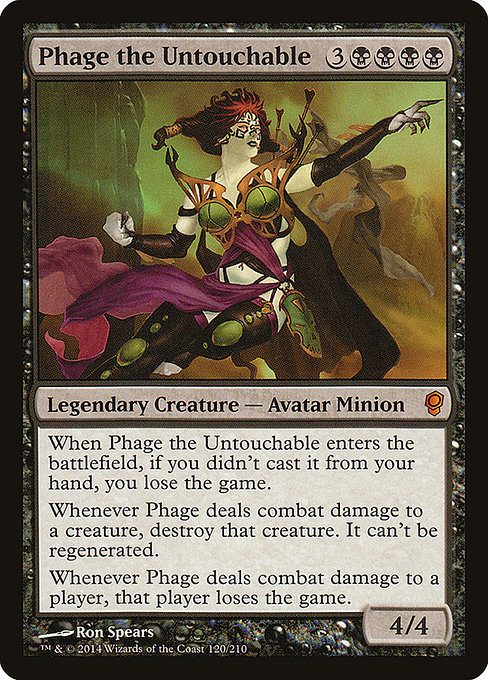 , which kills a player when it hits it. This creature is easily countered by any indestructible creature, like Blightsteel Colossus
, which kills a player when it hits it. This creature is easily countered by any indestructible creature, like Blightsteel Colossus ! This kills the Phage player easily. One way to kill the Blightsteel Colossus is to exile it with Ulamog, the Ceaseless Hunger
! This kills the Phage player easily. One way to kill the Blightsteel Colossus is to exile it with Ulamog, the Ceaseless Hunger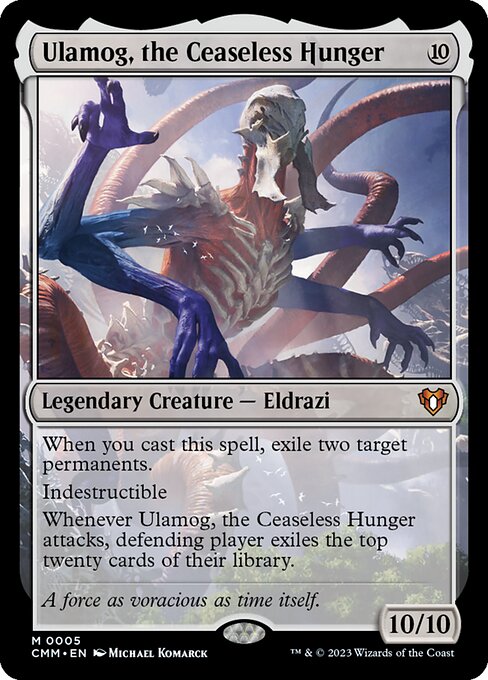 . Or, alternatively, it is sacrificed by Emrakul, the Aeons Torn
. Or, alternatively, it is sacrificed by Emrakul, the Aeons Torn . I’m pretty sure that of these four cards, Emrakul wins all of the match ups.
. I’m pretty sure that of these four cards, Emrakul wins all of the match ups.
Removal
Some way to kill the Big Creatures mentioned above is by removing them. Sheoldred, Whispering One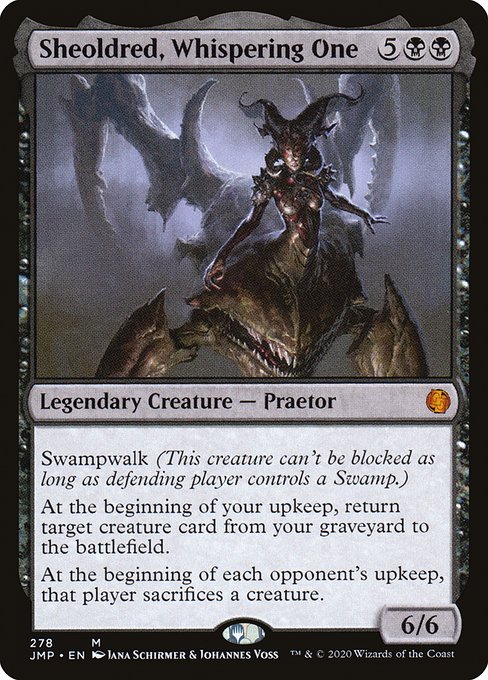 makes it so that their opponent has to sacrifice their creature. Solitude
makes it so that their opponent has to sacrifice their creature. Solitude , Fiend Hunter
, Fiend Hunter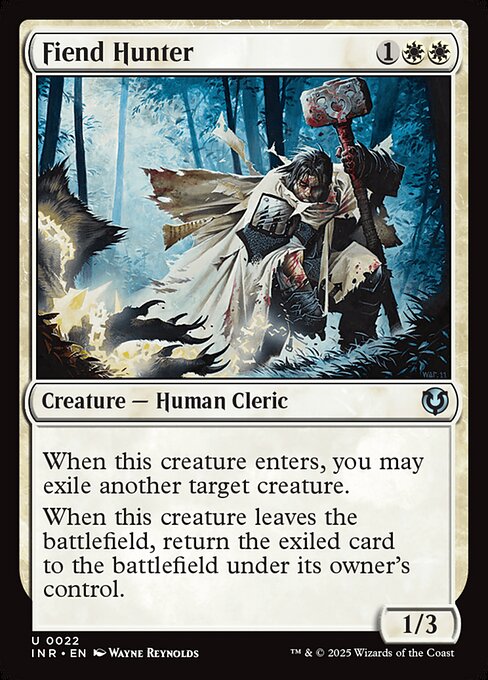 , and Amphin Mutineer
, and Amphin Mutineer all allow their user to exile their opponents’ threats. Most of these could win against some Big Creatures depending on what creature it is. Some of them would be draws though, like most of them versus the exiling creatures because neither would want to play anything. Sheoldred could win against all big creatures though.
all allow their user to exile their opponents’ threats. Most of these could win against some Big Creatures depending on what creature it is. Some of them would be draws though, like most of them versus the exiling creatures because neither would want to play anything. Sheoldred could win against all big creatures though.
Discard
One way to make sure your opponent never wins is by having them discard their card. If you discard the card your opponent is about to play, they will not be able to play it anymore. Davriel, Rogue Shadowmage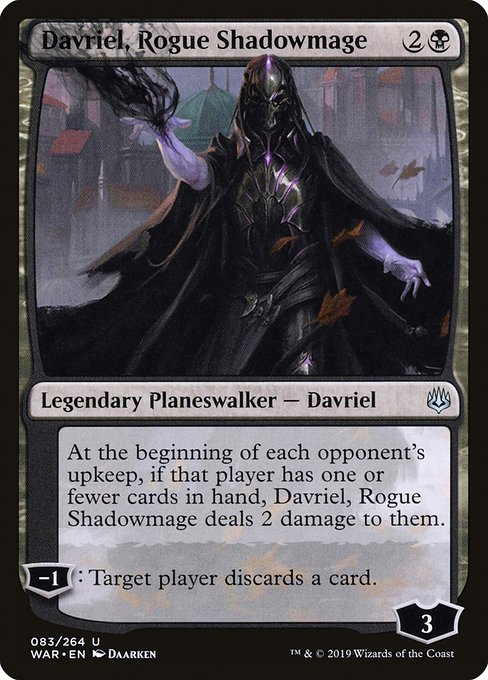 is very interesting as this is the first noncreature card we’ve looked at. That is because this is one of the few noncreature cards that can deal consistent damage against a player. If you go first, simply play it, minus one it, and sit back as your opponent slowly dies. Archon of Cruelty
is very interesting as this is the first noncreature card we’ve looked at. That is because this is one of the few noncreature cards that can deal consistent damage against a player. If you go first, simply play it, minus one it, and sit back as your opponent slowly dies. Archon of Cruelty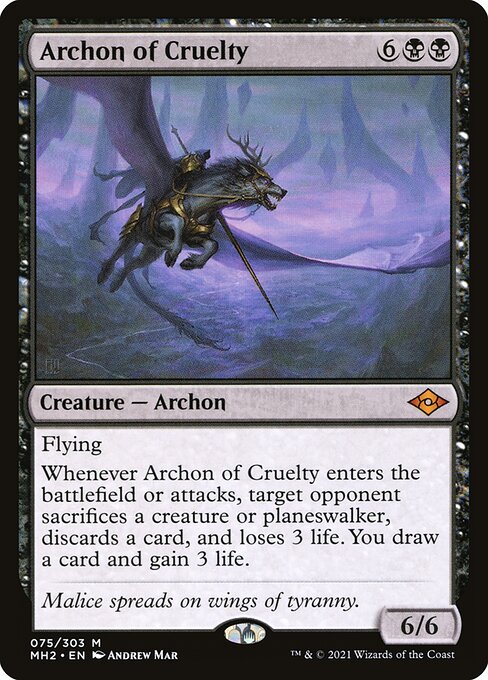 is really strong because if you are too late and your opponent played their card first, you can still remove it, so Archon falls into Removal as well. It is also a flyer and the life swing would also always work in your favor. Rankle, Master of Pranks
is really strong because if you are too late and your opponent played their card first, you can still remove it, so Archon falls into Removal as well. It is also a flyer and the life swing would also always work in your favor. Rankle, Master of Pranks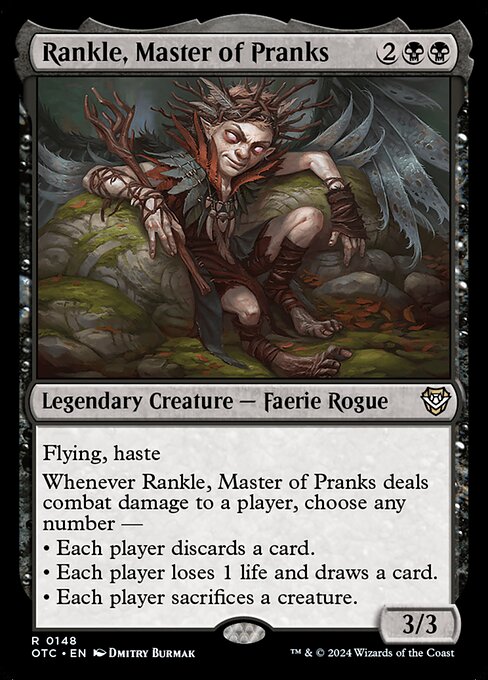 is sort of good. The only option you can really use with his ability is the first one, maybe the second one for the damage on your opponent but I doubt that will matter in most cases. The last option is just bad, except for maybe forcing a draw. Finally we have Dusk Mangler
is sort of good. The only option you can really use with his ability is the first one, maybe the second one for the damage on your opponent but I doubt that will matter in most cases. The last option is just bad, except for maybe forcing a draw. Finally we have Dusk Mangler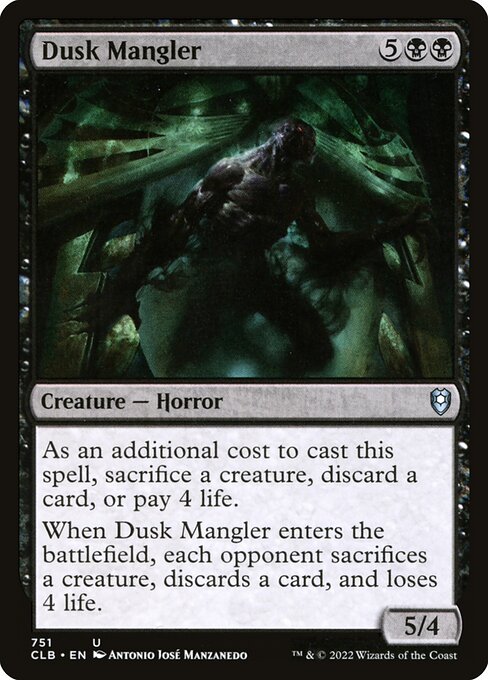 which is very similar to Archon, just mostly a bit worse. All of these, sadly, lose to shuffle titans though.
which is very similar to Archon, just mostly a bit worse. All of these, sadly, lose to shuffle titans though.
Discard Hate
Apart from the shuffle titans there are also these cards who like getting discarded, all of these straight up win against Davriel, but lose (or draw) to most others. Wilt-Leaf Liege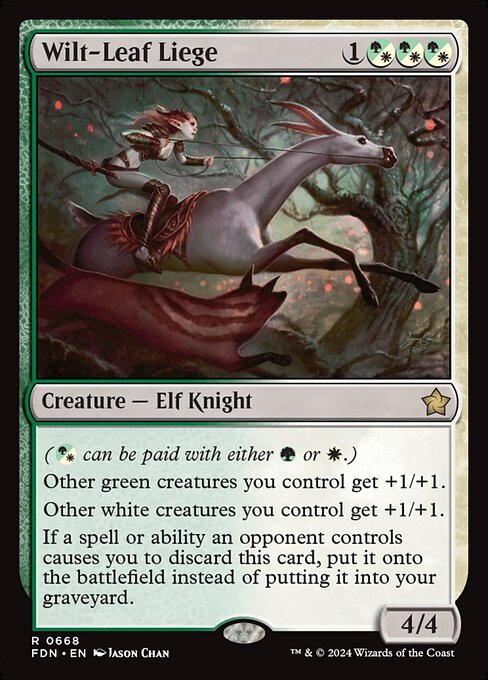 , Loxodon Smiter
, Loxodon Smiter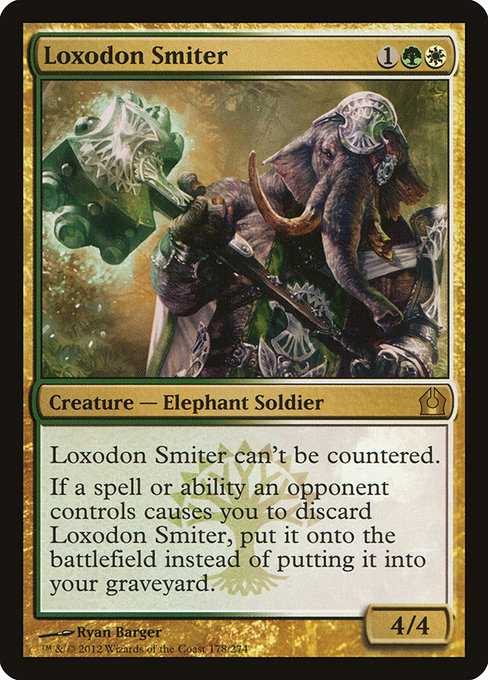 , and Quagnoth
, and Quagnoth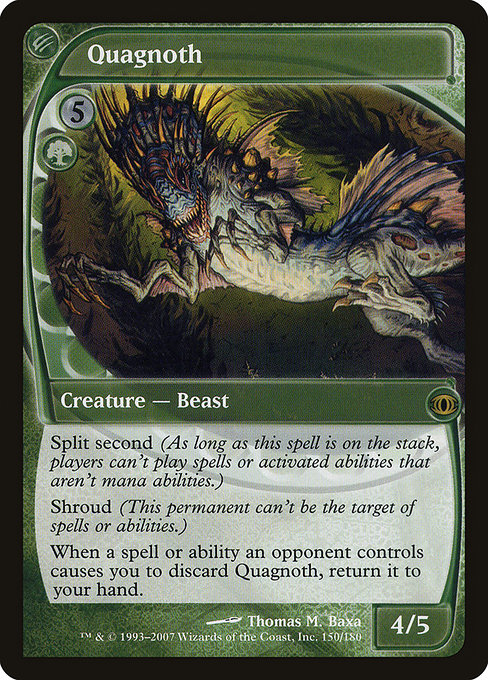 all draw against Dusk Mangler due to their size and killing each other on block. But Nullhide Ferox
all draw against Dusk Mangler due to their size and killing each other on block. But Nullhide Ferox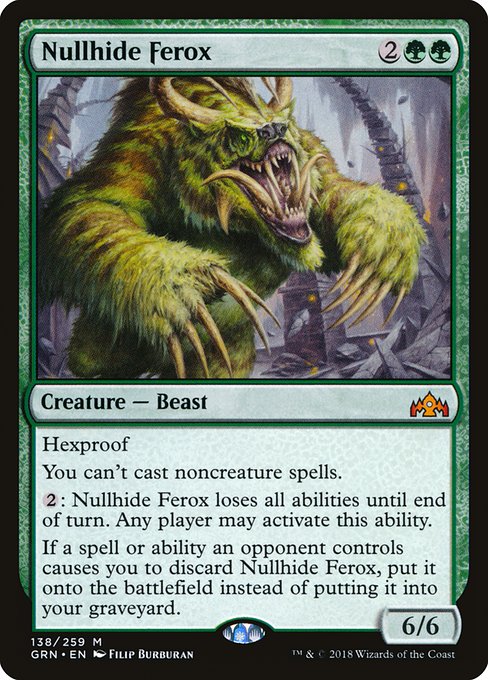 actually wins against Dusk Mangler. They all lose to Archon of Cruelty though.
actually wins against Dusk Mangler. They all lose to Archon of Cruelty though.
One potentially interesting card to play against Discard is Orvar, the All-Form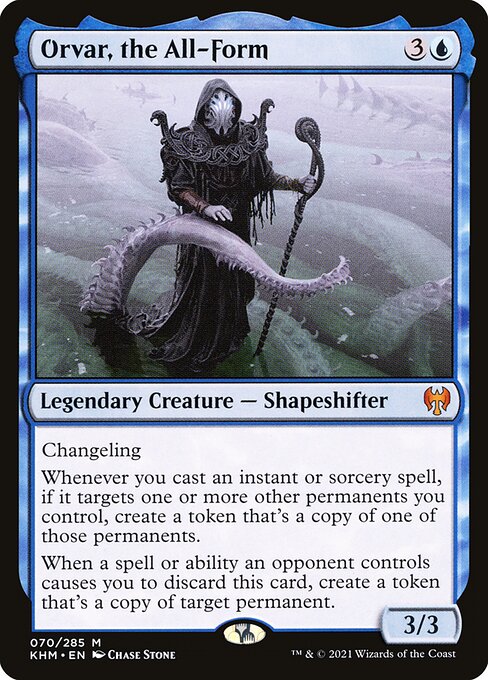 . Orvar, when discarded, makes a copy of a permanent and actually wins against Archon if the Archon player plays it first, Orvar gets discarded and then the ETB of the copy of Archon removes the first Archon. Leaving the Orvar, the All-Form player with a copy of an Archon of Cruelty. However, the Archon player will simply refuse to play their card and the Orvar player will refuse to play theirs since Orvar loses if their card is played first.
. Orvar, when discarded, makes a copy of a permanent and actually wins against Archon if the Archon player plays it first, Orvar gets discarded and then the ETB of the copy of Archon removes the first Archon. Leaving the Orvar, the All-Form player with a copy of an Archon of Cruelty. However, the Archon player will simply refuse to play their card and the Orvar player will refuse to play theirs since Orvar loses if their card is played first.
Noncreatures
So far we’ve only looked at creatures, this is mostly because resolving a creature and having it be the only creature without any other threats is one of the easiest ways to win: just attack repeatedly. There are a few ways to win with a noncreature deck however. There are more ways to win but these are just a few examples based on the ones in the Cardmarket video.
Tokens
One of the ways to win with noncreature spells is with token generating cards, preferably overwhelming token generation. Like Storm Herd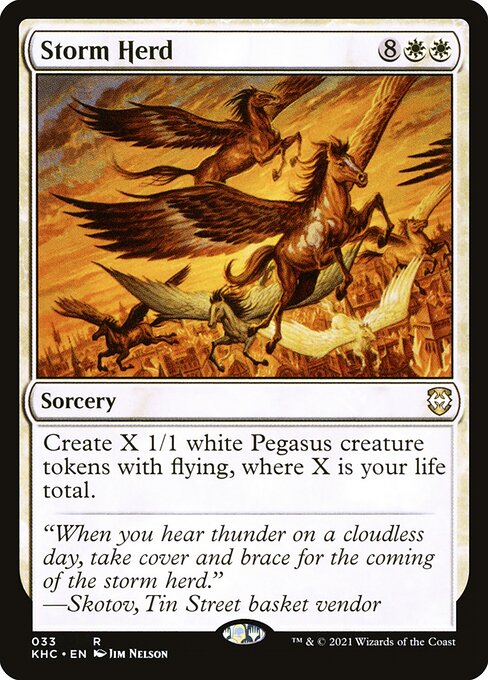 , Crush of Wurms
, Crush of Wurms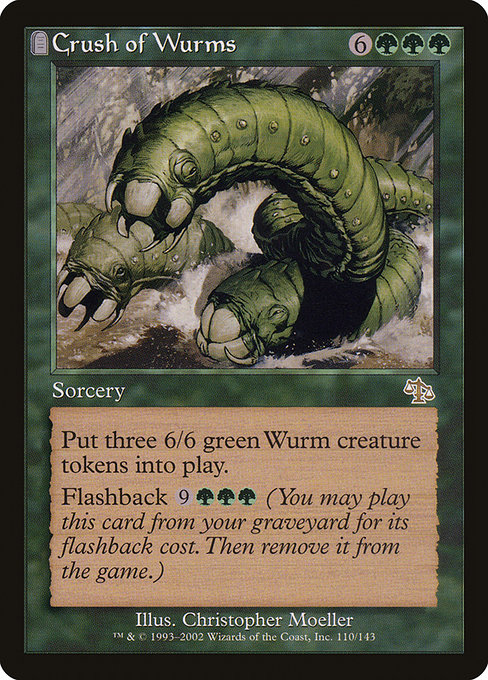 or Army of the Damned
or Army of the Damned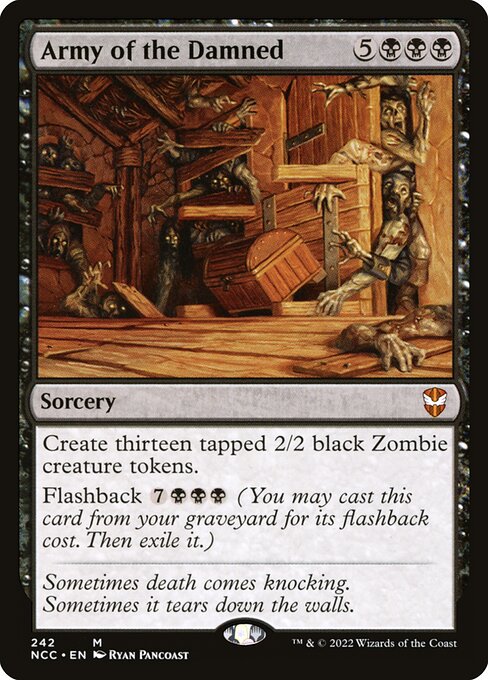 . These last two also have flashback, but sadly that doesn’t help in this format as I’ve set the rules to be so that every player has an Omniscience-like effect. And Omniscience doesn’t allow the player to cast Flashback for free. If you also want to add a boardwipe for powerful creatures then you can use Elspeth, Sun’s Champion
. These last two also have flashback, but sadly that doesn’t help in this format as I’ve set the rules to be so that every player has an Omniscience-like effect. And Omniscience doesn’t allow the player to cast Flashback for free. If you also want to add a boardwipe for powerful creatures then you can use Elspeth, Sun’s Champion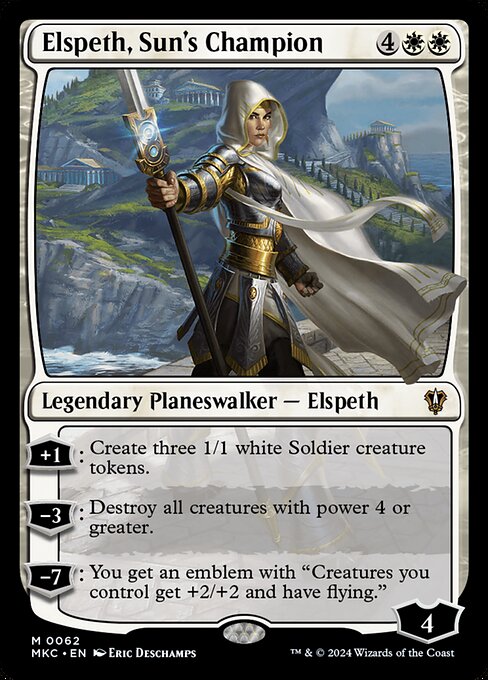 , Elspeth wins against a lot of powerful creatures by simply removing them and then creating tokens to fight.
, Elspeth wins against a lot of powerful creatures by simply removing them and then creating tokens to fight.
Steal
Stealing is also a pretty good strat. Something like Gather Specimens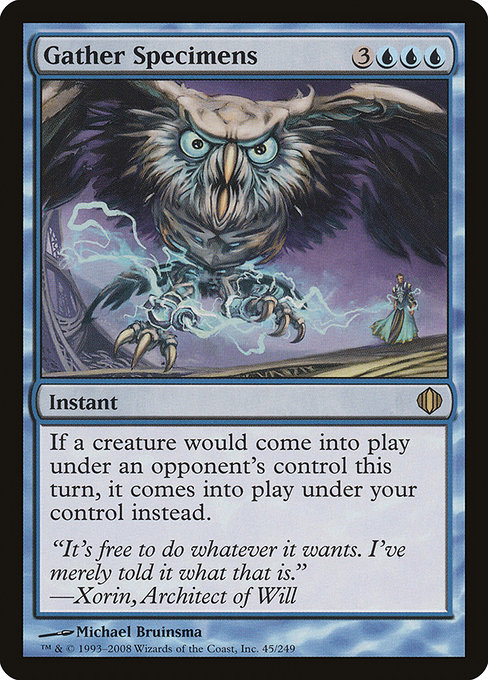 allows the player to steal their opponents creatures before they even hit the board. Both Control Magic
allows the player to steal their opponents creatures before they even hit the board. Both Control Magic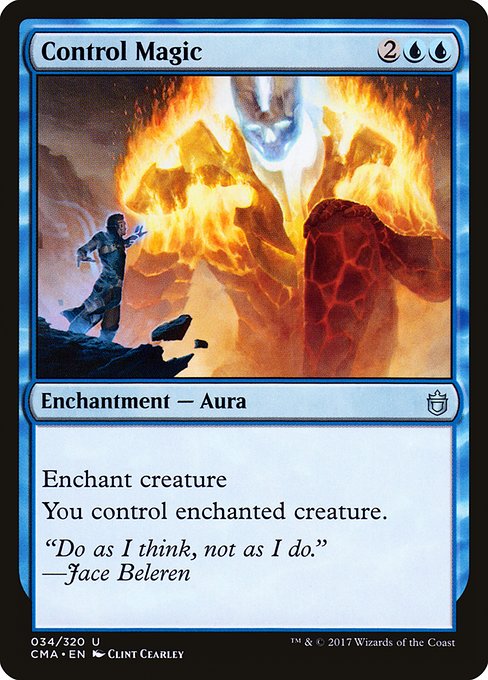 and Agent of Treachery
and Agent of Treachery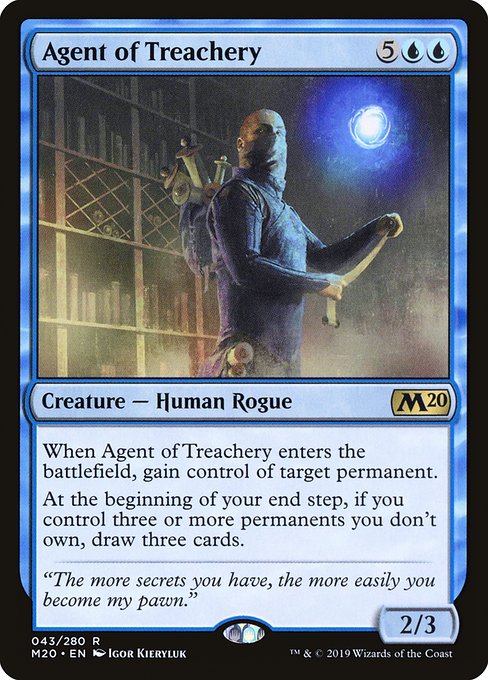 are good for targeting creatures that just entered. And Emrakul, the World Anew
are good for targeting creatures that just entered. And Emrakul, the World Anew is also pretty good because it is a cast trigger. So even if Emrakul itself is countered it will still steal your opponents’ creatures.
is also pretty good because it is a cast trigger. So even if Emrakul itself is countered it will still steal your opponents’ creatures.
Burn
Another way to win with noncreatures is by burning your opponent. The Rack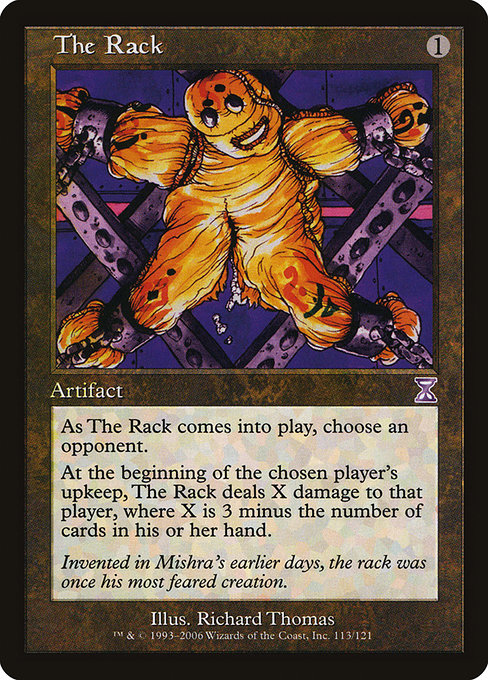 comes to mind as it is a staple for some decks in Three Card Blind. It deals 3 damage each turn after your opponent has played their card. It loses to most creature decks, if those creatures are counters or if they have a power greater than 3. Still, for against some decks, like Gather Specimens, The Rack wins because the Gather Specimens just can’t do anything useful. Roiling Vortex
comes to mind as it is a staple for some decks in Three Card Blind. It deals 3 damage each turn after your opponent has played their card. It loses to most creature decks, if those creatures are counters or if they have a power greater than 3. Still, for against some decks, like Gather Specimens, The Rack wins because the Gather Specimens just can’t do anything useful. Roiling Vortex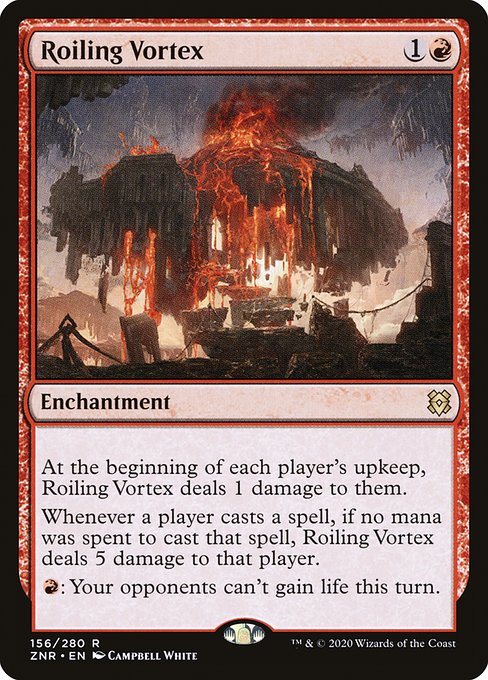 is the same, except with lower damage per turn. But, if the Vortex player goes first, they would deal 5 damage to their opponent if they cast their card after. Chandra, Awakened Inferno
is the same, except with lower damage per turn. But, if the Vortex player goes first, they would deal 5 damage to their opponent if they cast their card after. Chandra, Awakened Inferno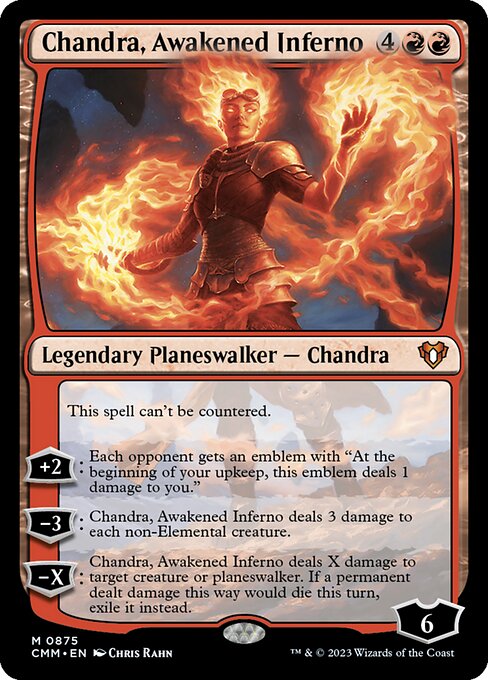 is also very good because it has a lot of loyalty, can get a lot of loyalty, can add unremovable emblems, and kill a lot of things. If the Chandra player goes first, they do the +2, then if their opponent plays something the Chandra player could -8 to kill a creature with 8 toughness or a planeswalker with 8 loyalty. Finally Ugin, the Spirit Dragon
is also very good because it has a lot of loyalty, can get a lot of loyalty, can add unremovable emblems, and kill a lot of things. If the Chandra player goes first, they do the +2, then if their opponent plays something the Chandra player could -8 to kill a creature with 8 toughness or a planeswalker with 8 loyalty. Finally Ugin, the Spirit Dragon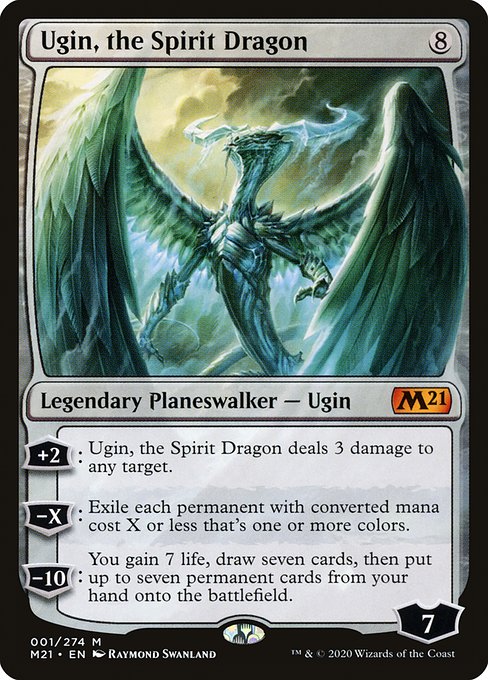 . Saving the best for last. Using the same logic as with Chandra, Ugin could exile a 9 mana value creature or planeswalker or enchantment or whatever, however if the Uginplayer does that they will draw because that kills Ugin and their only damage source.
. Saving the best for last. Using the same logic as with Chandra, Ugin could exile a 9 mana value creature or planeswalker or enchantment or whatever, however if the Uginplayer does that they will draw because that kills Ugin and their only damage source.
Acererak the Arclich
I’ve determined that there is at least one way to win turn one in this weird made-up format I created (even though all formats are made up, even Magic itself is made up, huh). It is with Acererak the Archlich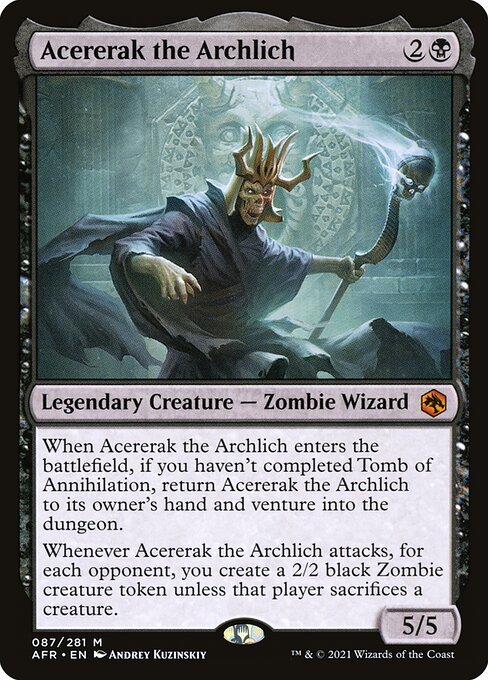 . It’s very simple: keep casting it and go through the Lost Mine of Phandelver
. It’s very simple: keep casting it and go through the Lost Mine of Phandelver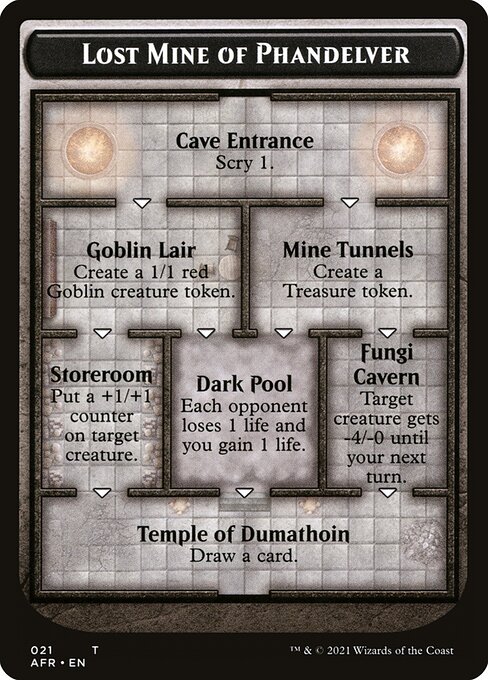 , choosing to go to the Dark Pool room at every chance you get. At the end of your turn your opponent will have perished and you will be at 40 life. This is very strong, the only way to stop this is with interaction and, unless the opponent is going first, that means counterspells.
, choosing to go to the Dark Pool room at every chance you get. At the end of your turn your opponent will have perished and you will be at 40 life. This is very strong, the only way to stop this is with interaction and, unless the opponent is going first, that means counterspells.
Counters On A Body
One of the cards that stood out to me was Mystic Snake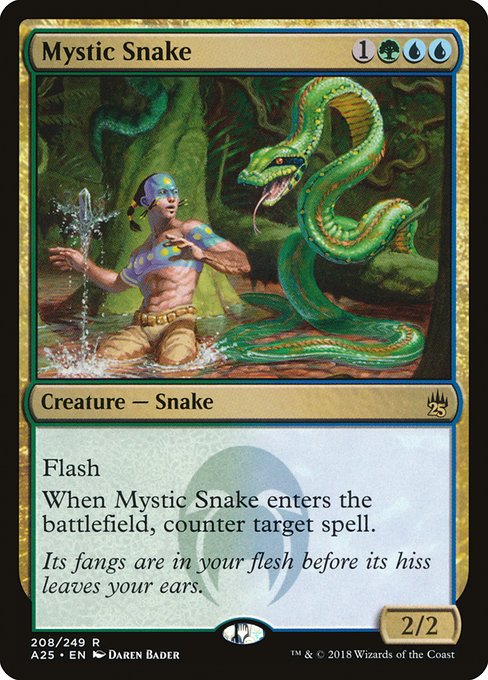 and similar cards (e.g. Hope-Ender Coatl
and similar cards (e.g. Hope-Ender Coatl , Ertai Resurrected
, Ertai Resurrected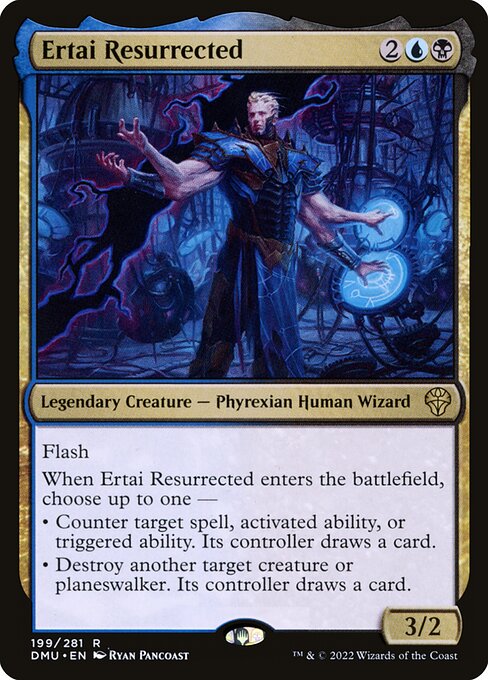 or Aven Interrupter
or Aven Interrupter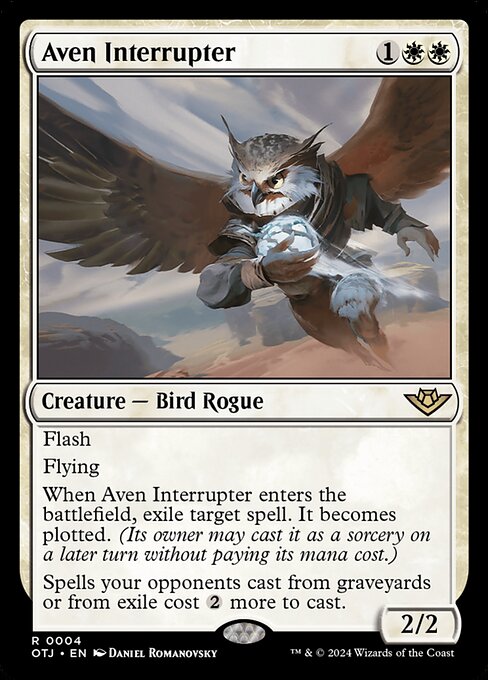 ) which all counter a spell when they enter in some way (or on cast in the case of Hope-Ender Coatl). These cards are very powerful since they beat almost every other card but there are some exceptions. First of all, as demonstrated in the Cardmarket video, two people with counterspell creatures will not be able to win, because the player who plays their creature first loses, so those games would probably be reach their conclusion by an agreed-upon draw since that is the best outcome for both players.
) which all counter a spell when they enter in some way (or on cast in the case of Hope-Ender Coatl). These cards are very powerful since they beat almost every other card but there are some exceptions. First of all, as demonstrated in the Cardmarket video, two people with counterspell creatures will not be able to win, because the player who plays their creature first loses, so those games would probably be reach their conclusion by an agreed-upon draw since that is the best outcome for both players.
Uncounterable
Some other cards that could beat these counter creatures are the recently spoiled Absolute Virtue . Or the ever-powerful Emrakul, the Aeons Torn
. Or the ever-powerful Emrakul, the Aeons Torn . Which have the text “This spell can’t be countered”, which means that some of these counterspell creatures won’t work. Hope-Ender Coatl or Aven Interrupter exile target spell. Which means that uncounterable doesn’t apply. We can fix this with creatures with Split Second. There are only three, Celestial Crusader
. Which have the text “This spell can’t be countered”, which means that some of these counterspell creatures won’t work. Hope-Ender Coatl or Aven Interrupter exile target spell. Which means that uncounterable doesn’t apply. We can fix this with creatures with Split Second. There are only three, Celestial Crusader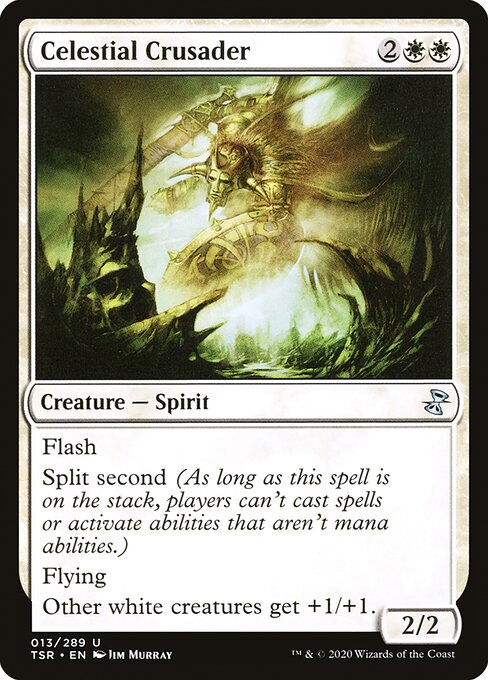 , Sulfur Elemental
, Sulfur Elemental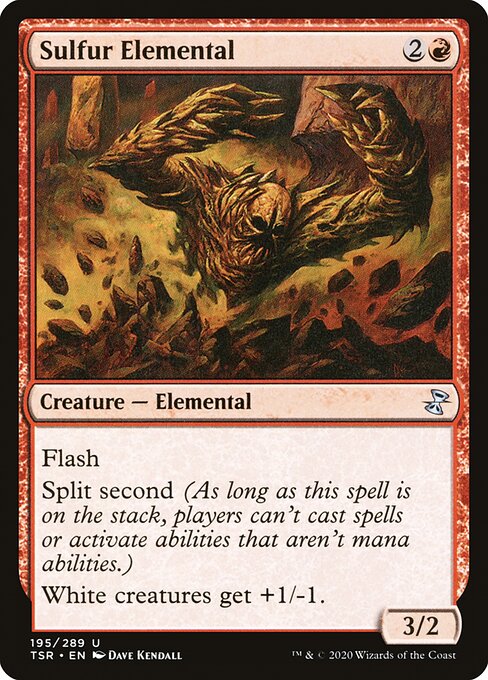 and Quagnoth
and Quagnoth .
.
Notably, shuffle titans also beat this strategy because after they are shuffled back into their owner’s library, that player can draw and play them again. This means that in particular, Emrakul, the Aeons Torn can only be removed by exiling it either on the stack or on board.
Automatic Counters
There are also a few cards that automatically counter any card that has been cast without having mana spent on it. A few, like Vexing Bauble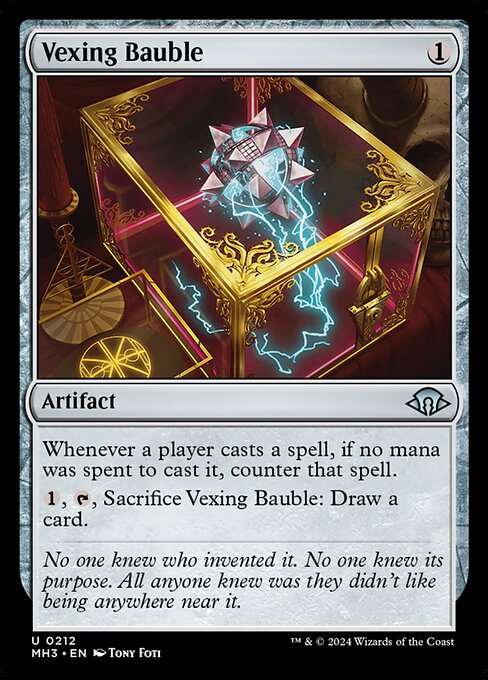 and Void Mirror
and Void Mirror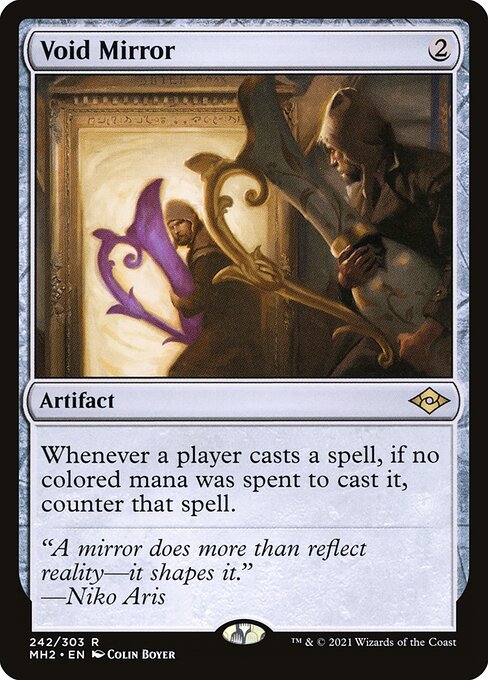 , both are useless because they can only prevent the opponent from casting their spell, not helping their user to win in the slightest. Lavinia, Azorius Renegade
, both are useless because they can only prevent the opponent from casting their spell, not helping their user to win in the slightest. Lavinia, Azorius Renegade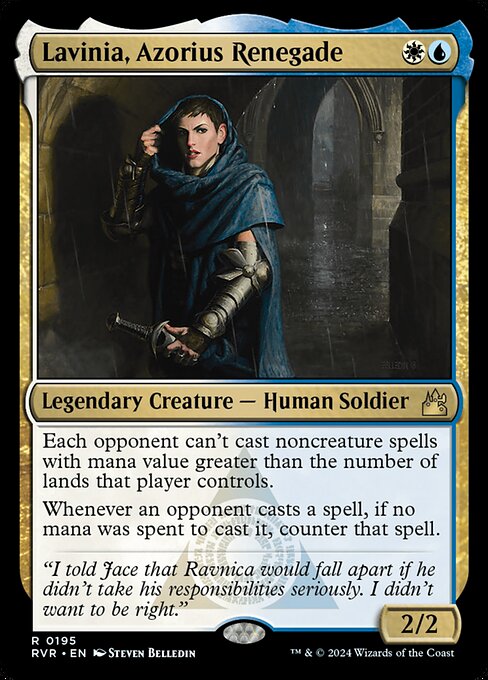 states that free spells are countered and that basically all noncreature spells can’t even attempt to be cast. Boromir, Warden of the Tower
states that free spells are countered and that basically all noncreature spells can’t even attempt to be cast. Boromir, Warden of the Tower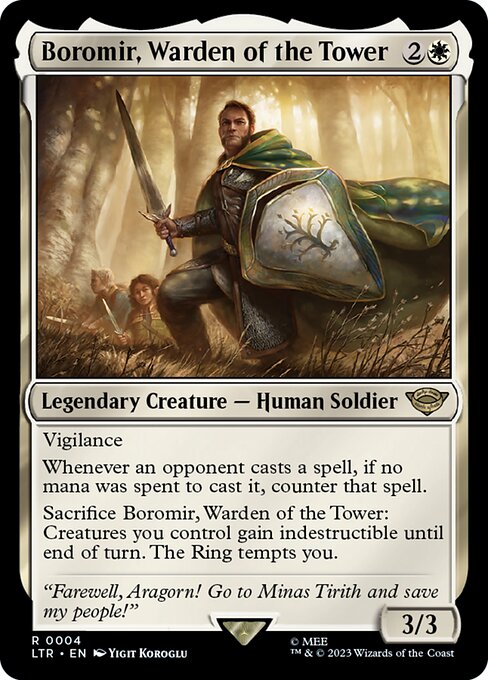 is a 3/3 and for that reason I think marginally stronger than Lavinia.
is a 3/3 and for that reason I think marginally stronger than Lavinia.
Prevents Cast
These cards prevent the opponent from even deploying their own threat. Both Council of the Absolute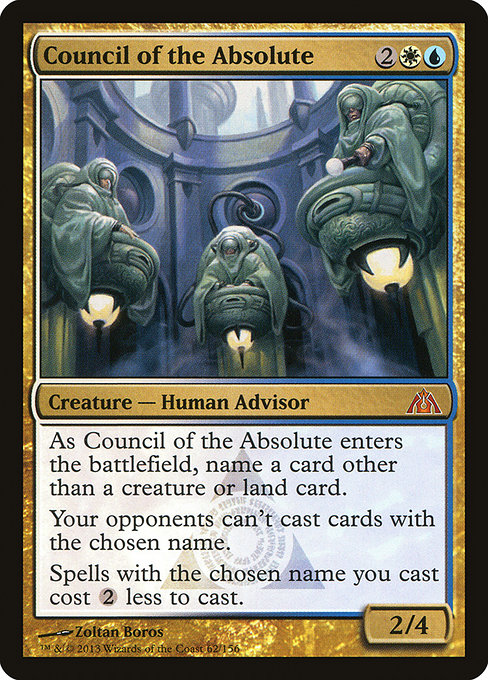 and Meddling Mage
and Meddling Mage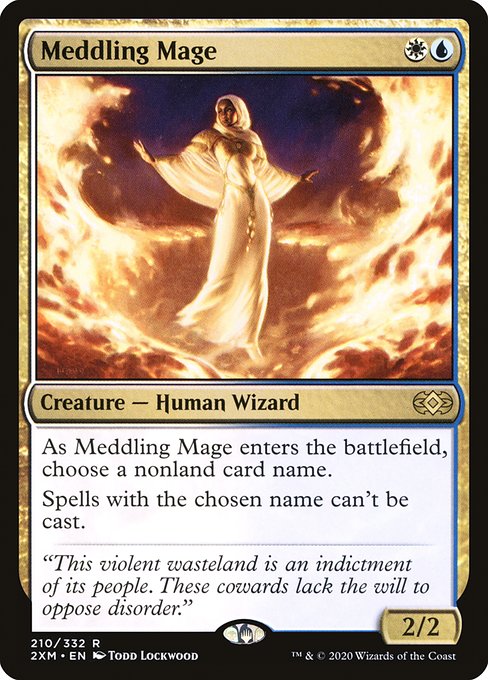 require a name, but with perfect information and play we always know that. The only trouble is going first because if we go second we won’t be able to prevent the spell from being cast and it will slip through. Gaddock Teeg
require a name, but with perfect information and play we always know that. The only trouble is going first because if we go second we won’t be able to prevent the spell from being cast and it will slip through. Gaddock Teeg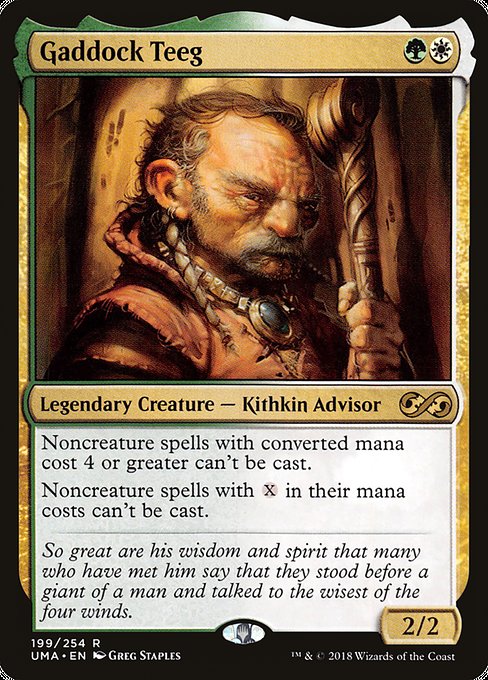 only works against cards like Chandra, Awakened Inferno and other high-costed noncreature spells. Iona, Shield of Emeria
only works against cards like Chandra, Awakened Inferno and other high-costed noncreature spells. Iona, Shield of Emeria is absolutely busted going first because you could prevent your opponent from playing their spells, unless they’re playing Emrakul, but apart from the colorless powerhouses her player could beat a lot of decks if they went first.
is absolutely busted going first because you could prevent your opponent from playing their spells, unless they’re playing Emrakul, but apart from the colorless powerhouses her player could beat a lot of decks if they went first.
Chancellor of the Annex
Chancellor of the Annex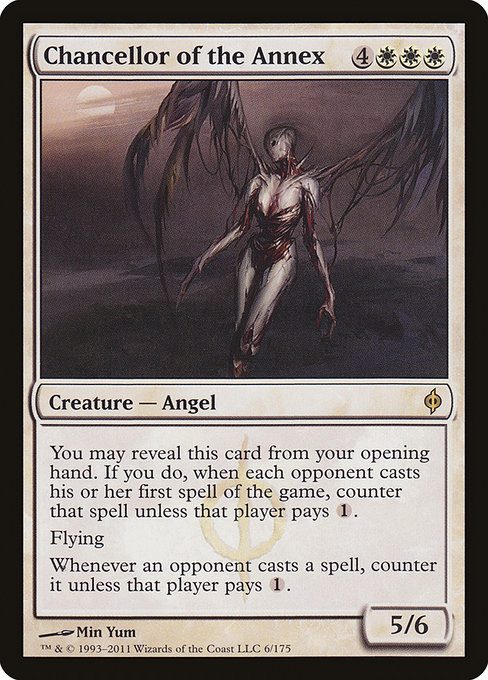 is a very powerful card. For most of the same reasons as the other counter creatures, but this one is way more powerful because it is automatic and unstoppable. If the opponent does not have a card with “This spell can’t be countered” then the game is over then and there. You can’t even get a creature with Split Second through Chancellor. However as I mentioned it can be beaten, by Absolute Virtue for example, and numerous other cards. And in the case that a Chancellor faces itself, it is a draw because neither player can resolve their own Chancellor.
is a very powerful card. For most of the same reasons as the other counter creatures, but this one is way more powerful because it is automatic and unstoppable. If the opponent does not have a card with “This spell can’t be countered” then the game is over then and there. You can’t even get a creature with Split Second through Chancellor. However as I mentioned it can be beaten, by Absolute Virtue for example, and numerous other cards. And in the case that a Chancellor faces itself, it is a draw because neither player can resolve their own Chancellor.
Conclusion
I think that these ramblings of mine have made it clear that there is not really a strongest Magic the Gathering card. All of them have their weaknesses and strengths, I think that I have provided counterplay to each card that I’ve gone through. Each card has some weakness which some other card can exploit.
Magic is a very complex game and I love it for that. It is amazing that they have all these things that interact in all different ways and I’ve learned quite a bit about a lot of different card and thinking about metagames. Thanks for reading!















































